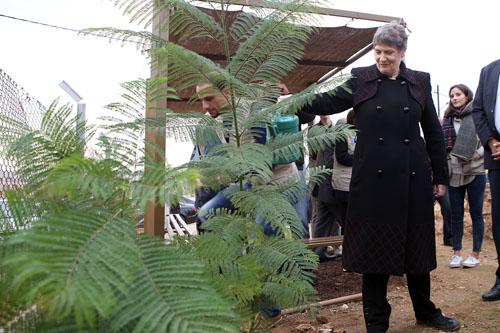You are here
King discusses Syrian refugee crisis with UNDP chief
By Bahaa Al Deen Al Nawas - Nov 10,2015 - Last updated at Nov 10,2015

UNDP Administrator Helen Clark waters trees at St George’s Church in Mafraq during an official visit on Sunday (Photo by Raad Adayleh)
AMMAN — His Majesty King Abdullah on Monday met with UNDP Administrator Helen Clark and discussed international support for Jordan to bear the repercussions of hosting Syrian refugees, a Royal Court statement said.
The meeting, held at Al Husseiniya Palace, covered the UNDP's contribution to enhancing the Kingdom's development, in addition to offering relief and humanitarian services to the refugees.
The King and Clark also discussed the Resilience Development Forum that the Kingdom hosted this week at the Dead Sea to achieve significant change in the international community's response to crises, particularly the Syrian crisis.
Clark highlighted the importance of supporting Jordan to deal with the repercussions of the crisis and said the UNDP will continue assisting the Kingdom to ensure its continued resilience and development, according to the statement.
On Sunday, the UNDP administrator visited the Ekeider Landfill project in Irbid and was briefed on the Livelihoods and Employment Interventions project in Mafraq as well as the Emergency Employment (3x6 Approach).
The tour of UNDP-supported projects in the areas most affected by the Syrian crisis was conducted on the sidelines of Clark’s official visit to Jordan where she inaugurated the Resilience Development Forum with Prime Minister Abdullah Ensour and the UNDP’s Regional Hub for Arab States with Deputy Prime Minister and Foreign Minister Nasser Judeh.
During a meeting at the Ekeider Landfill site attended by Municipal Affairs Minister Walid Masri and Director of the UNDP Regional Bureau for Arab States Sima Bahous, Canada's Assistant Deputy Minister for Europe and Middle East Alex Bugailiskis said Jordan is an example of leadership in the region and to the world.
She noted that Canada supports municipalities to scale up and provide better services to local communities, voicing her country’s commitment to improving the living conditions of host communities and refugees in Jordan.
Clark said UNDP is also committed to supporting host communities in Jordan.
“They are carrying a load for the world and should not carry too much,” she noted.
Established in 1981, Ekeider Landfill is the second largest landfill in Jordan and is located one kilometre away from the Syrian-Jordanian border, according to a presentation delivered during the meeting.
It serves more than 30 municipalities in the north.
But due to the Syrian refugee influx, which increased the waste it receives from 900 tonnes to 1,300 tonnes per day, the landfill is working at a higher capacity than its design.
The Jordan Response Plan appealed for $38,188,588 to revamp the landfill.
Canada contributed funds worth $13,481,400 while Jordan allocated $2.2 million, leaving a funding gap of $22,707,188.
The UNDP and the Ministry of Municipal Affairs are working together in order to bridge that gap, according to the presentation.
After the meeting, Clark toured the Ekeider site and was briefed by engineers on work process and future plans to rehabilitate the landfill.
In Mafraq, the UNDP administrator was accompanied by Bahous, MPs, officials and community representatives, where she was briefed on micro-businesses financed by the agency.
With support from UNDP, 100 unemployed people in Rehab Municipality implemented eight voluntary initiatives over three months.
Clark also visited the mural-wall painting on the UN Sustainable Development Goals, which follow the UN's Millennium Development Goals, and toured St George’s Church, the oldest church in the world, where members of the emergency employment project briefed her on work to promote it as a major destination for religious tourism.
As for further development projects, Clark told The Jordan Times that plans are in place but funding must be mobilised first.
She said that when the response for the Syrian crisis began, it initially focused on relief, but this is no longer adequate as people want jobs and dignity.
Related Articles
AMMAN — Helen Clark, administrator of the United Nations Development Programme (UNDP) and chair of the UN Development Group (UNDG), arrived
AMMAN — New management buildings and infrastructure were launched by the UNDP on Wednesday at Al Ekeider landfill, according to a UNDP state
Prime Minister Abdullah Ensour on Thursday met with Sima Bahous, director of the UNDP Regional Bureau for Arab States, and discussed bilateral cooperation.
















